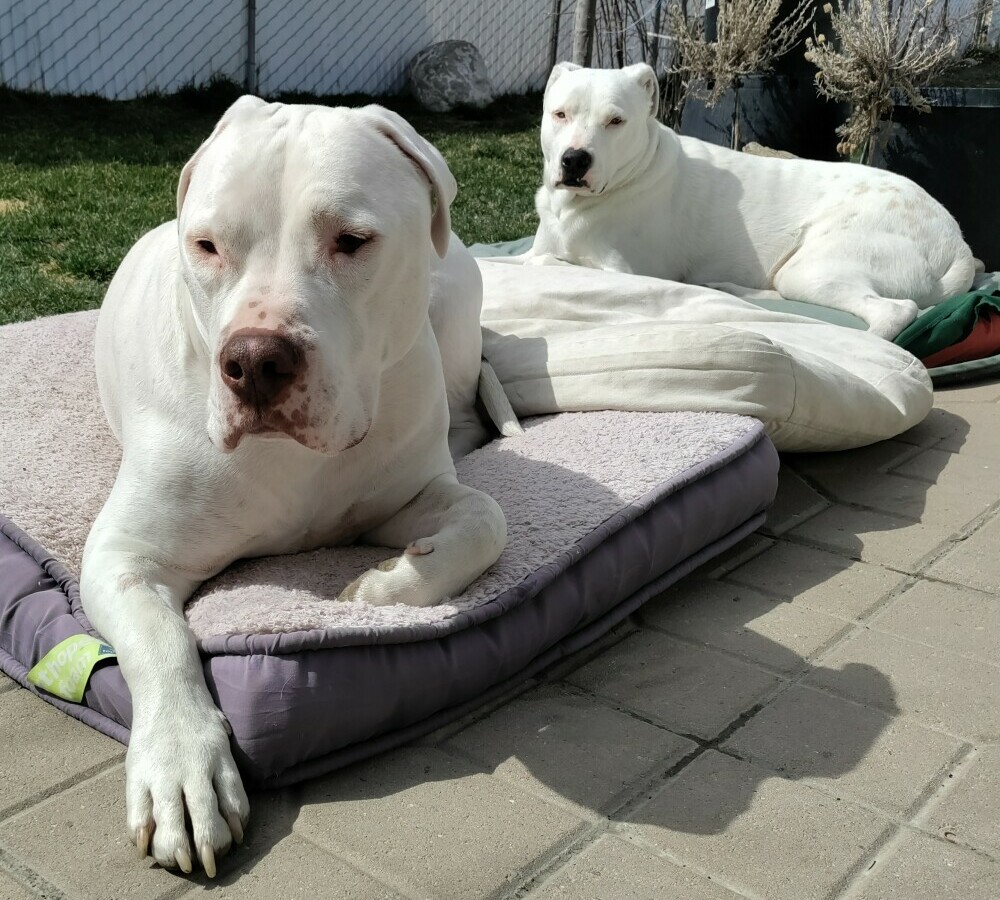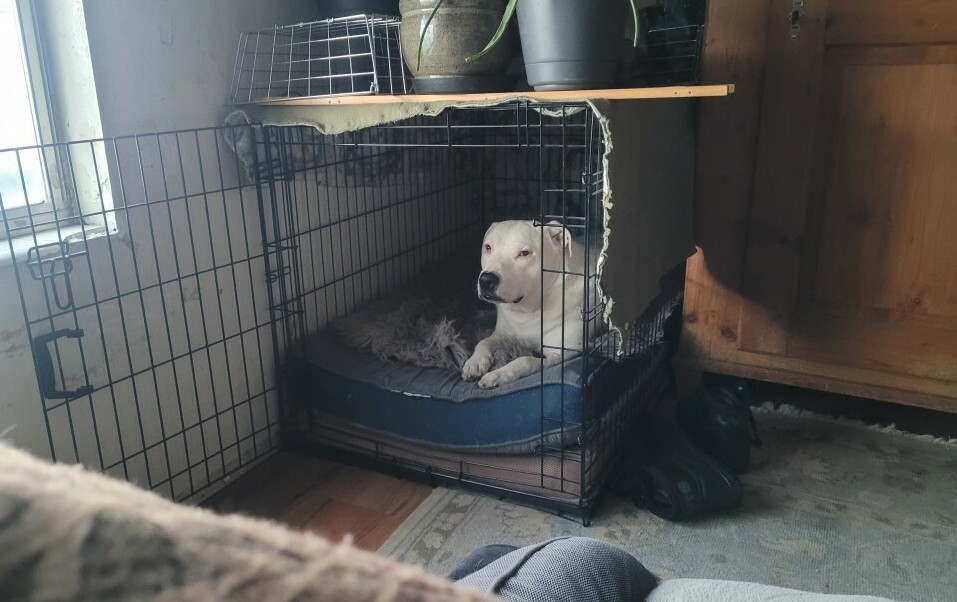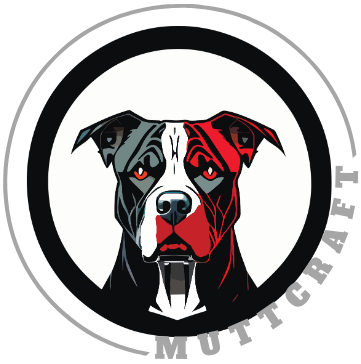Recognizing And Treating Anxiety In Pit Bulls
 Anxiety in dogs, much like in humans, can significantly impact well-being. For pit bulls, whose stoic demeanor often masks their sensitivity, anxiety can manifest in various subtle and overt behaviors. In this section, I explore what triggers anxiety in these dogs and how to spot the warning signs.
Anxiety in dogs, much like in humans, can significantly impact well-being. For pit bulls, whose stoic demeanor often masks their sensitivity, anxiety can manifest in various subtle and overt behaviors. In this section, I explore what triggers anxiety in these dogs and how to spot the warning signs.
Why might a breed like the pit bull be more prone to anxiety? Several factors contribute to this predisposition, including a past of selective breeding and, unfortunately, sometimes abusive or negligent histories. This breed’s eagerness to please and strong desire for human companionship also make them sensitive to stress.
Distinguishing between temporary stress reactions, such as fear during thunderstorms, and persistent anxiety disorders is crucial. Chronic anxiety may lead to behavior issues and health problems if left unaddressed.
I’ll guide you through spotting pit bull-specific signals of anxiety. Recognizing symptoms such as excessive licking, persistent pacing, or destructive behavior can be telltale signs. Early intervention not only helps manage immediate stressors but also paves the way for successful long-term treatment.
With a clear understanding of what anxiety looks like in your pit bull, you’ll be better equipped to pinpoint what might be causing their distress. The next section delves into the vital role you play in their life, how you can identify triggers, and ways to build a trustful and secure bond that facilitates a calming environment.
The Human-Pit Bull Bond: Identifying Trigger Points
 A critical factor in managing anxiety in pit bulls is understanding the influence you, as an owner, have. Your behavior, emotions, and routines can significantly affect your pet’s mental state. Stress can manifest as a result of inconsistency in the household, such as irregular feeding times, unpredictable schedules, or even your own stress levels.
A critical factor in managing anxiety in pit bulls is understanding the influence you, as an owner, have. Your behavior, emotions, and routines can significantly affect your pet’s mental state. Stress can manifest as a result of inconsistency in the household, such as irregular feeding times, unpredictable schedules, or even your own stress levels.
Environmental factors also play a notable role. Noises like fireworks or thunderstorms, new people or animals in the house, or even moving to a new home can be significant triggers. It’s also worthwhile to mention that a lack of sufficient socialization during their formative puppy years can make pit bulls more prone to anxiety when they encounter new situations or beings.
One of my current pit bulls even had an adverse reaction to an allergy shot that made his anxiety go way up compared to his normal calm behavior.
You can help your pit bull by providing a structured daily routine. Regular meal times, exercise, and sleep patterns can create a sense of security and predictability for your dog. The familiarity of a schedule can be calming for an animal that is prone to anxiety.
Additionally, the right amount of physical activity is crucial. Pit bulls are energetic, and without an outlet for their energy, their anxiety levels can spike. Integrating playtime and exercise into your dog’s schedule can help manage anxiety. But remember, it’s not just the quantity of the exercises but also the quality—mental stimulation is just as important as physical.
I have adopted a scheduled play time every morning for my dogs while i’m getting ready for work.
This section prepares you to make informed decisions about the appropriate treatments to explore for your pit bull’s anxiety. Understanding that treatment is multifaceted, you’ll learn that medication may sometimes be necessary, but often behavioral techniques and environment adjustments can lead to significant improvements.
Comprehensive Treatment Strategies for Anxious Pit Bulls
 If your pit bull struggles with anxiety, it’s crucial to develop a well-rounded treatment plan. Seeking professional advice is often the first step. A veterinarian or a certified animal behaviorist can offer a diagnosis and suggest a tailored approach to managing your dog’s anxiety.
If your pit bull struggles with anxiety, it’s crucial to develop a well-rounded treatment plan. Seeking professional advice is often the first step. A veterinarian or a certified animal behaviorist can offer a diagnosis and suggest a tailored approach to managing your dog’s anxiety.
Behavior modification can be highly successful for pit bulls. This might include desensitization, which slowly exposes your pit bull to their stressors in a controlled way, or counter conditioning, associating the anxiety-inducing situation with something positive. Training consistency is key here.
Natural remedies, such as pheromone diffusers or calming supplements, can be considered. However, it’s important to discuss these with your vet to ensure they’re safe and appropriate for your individual dog.
In some cases, medication might be necessary, especially if the anxiety is severe. Medications should always be prescribed by a professional and used as part of a broader treatment plan that includes behavioral strategies.
Diet plays a role in managing anxiety too. A balanced diet with adequate nutrients can contribute to overall well-being, potentially easing anxiety symptoms. Research is still ongoing, but some studies suggest that omega-3 fatty acids and certain vitamins and minerals might have a beneficial effect on mental health.
Above all, treating anxiety in pit bulls requires patience and consistency. There may be setbacks, but with a steady support system and a structured approach, your pit bull can learn to live a happier and more relaxed life.
Supporting Your Pit Bull Long-Term and Preventing Relapses
Adopting long-term measures to ease your pit bull’s anxiety isn’t just about reacting to stress—it’s about creating a stable and supportive environment that prevents stress from taking hold. Consistency in your daily routines and expectations can provide your pet the confidence and security they need.
Just as humans benefit from upskilling, pit bulls too can gain from advanced training techniques. These can enhance their ability to cope with stressors and improve their overall behavior. Regular socialization also keeps their anxiety in check by making sure they’re comfortable in various situations and with different people and animals.
Reacting swiftly and effectively at the first hint of a relapse into anxious behavior can save your pit bull from slipping back into full-blown anxiety. It’s crucial to stay vigilant and not to ignore the small signs. Early intervention is the key and can mean the difference between a minor hiccup and a major setback.
Joining support groups or online forums can make all the difference. Sharing experiences and solutions with fellow pit bull owners fosters a sense of community and provides a treasure trove of practical advice that can help you better understand and support your pet.
Finally, regular health checks with a vet, and if necessary, psychological assessments with a behaviorist, should not be underestimated. These check-ups are instrumental in keeping track of your pit bull’s physical and mental well-being and adjusting treatment plans as needed to ensure they stay on the path to a balanced and happy life.
